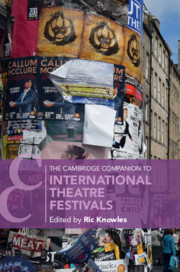Book contents
- The Cambridge Companion to International Theatre Festivals
- Cambridge Companions to Theatre and Performance
- The Cambridge Companion to International Theatre Festivals
- Copyright page
- Dedication
- Contents
- Contributors
- Acknowledgements
- Introduction
- Part I Contexts and Methods
- Chapter 1 From Post-War to ‘Second-Wave’
- Chapter 2 International Festivals, the Practice of Co-production, and the Challenges for Documentation in a Digital Age
- Chapter 3 City Festivals and Festival Cities
- Chapter 4 Indigenous Festivals
- Part II International Festivals Around the Globe
- Appendix List of International Theatre, Performance, and Multi-arts Festivals
- Works Cited
- Further Reading
- Index
Chapter 2 - International Festivals, the Practice of Co-production, and the Challenges for Documentation in a Digital Age
from Part I - Contexts and Methods
Published online by Cambridge University Press: 22 May 2020
- The Cambridge Companion to International Theatre Festivals
- Cambridge Companions to Theatre and Performance
- The Cambridge Companion to International Theatre Festivals
- Copyright page
- Dedication
- Contents
- Contributors
- Acknowledgements
- Introduction
- Part I Contexts and Methods
- Chapter 1 From Post-War to ‘Second-Wave’
- Chapter 2 International Festivals, the Practice of Co-production, and the Challenges for Documentation in a Digital Age
- Chapter 3 City Festivals and Festival Cities
- Chapter 4 Indigenous Festivals
- Part II International Festivals Around the Globe
- Appendix List of International Theatre, Performance, and Multi-arts Festivals
- Works Cited
- Further Reading
- Index
Summary
International theatre festivals are now a dominant phenomenon and have significantly influenced global theatre production since the 1980s. Against the backdrop of post-colonial criticism over the last three decades, the initial post-Second World War function of festivals to represent various national, mostly European cultures has gradually shifted towards festivals as co-producers of international work. Therefore, festivals appear as influential players in professional networks to establish and circulate aesthetic approaches in contemporary theatre practice. Due to the lack of sources on international festivals in archives and theatre collections, the chapter examines the possibilities and challenges of documenting these new modes of production and mobility in theatre archives. Focusing on to the complex professional network around the Philippines-based choreographer and performance artists Eisa Jocson and the role of Zürcher Theater Spektakel within this network, the chapter argues that digital media and data online for international co-production reveals the complex structures of professional networks and should be considered in research on international theatre festivals in a digital age.
Keywords
- Type
- Chapter
- Information
- Publisher: Cambridge University PressPrint publication year: 2020

